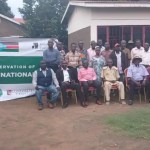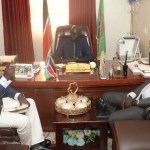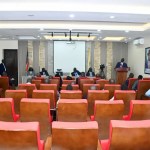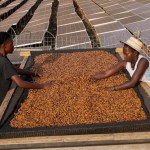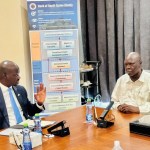(JUBA) – President Salva Kiir Mayardit has received a high level briefing from the Speaker of the Transitional National Legislative Assembly, Rt. Hon. Jemma Nunu Kumba, outlining Parliament’s current legislative agenda and progress on the upcoming national budget for the 2025–2026 financial year.
The meeting, held on Thursday 7 August 2025 at the State House in Juba, focused on the coordination between the Executive and the Legislature, especially in light of the imminent tabling of the new budget. Speaker Nunu reaffirmed that the National Assembly is finalising preparations to debate and pass the 2025–2026 fiscal plan, which is expected to prioritise economic recovery, institutional reforms, and essential services delivery.
Nunu commended President Kiir for his consistent support to the National Assembly, describing the relationship between the Executive and Legislature as central to peacebuilding, governance and development in South Sudan. She reiterated Parliament’s readiness to discharge its legislative and oversight roles effectively, especially at a time when budget decisions will be key to addressing citizens’ urgent needs.
The meeting builds on last year’s financial planning process, when the Minister of Finance and Planning, Hon. Dr. Marial Dongrin Ater, presented the 2024–2025 national budget to the Transitional National Legislature on 25 September 2024. The SSP 4.172 trillion (approx. 907 million USD at the official exchange rate of 1 USD = 4,600 SSP) proposed budget was developed under the theme: “To Accelerate Economic Recovery through Improving Livelihoods, Sustaining Peace and Investing in Critical Social Services and Agriculture.”
Summary of the key figures from the 2024–2025 national budget:
| Category | Amount (SSP) | Approx. in USD |
|---|---|---|
| Total Budget (Expenditure) | 4.172 trillion | $907 million |
| Resource Envelope (Total) | 2.258 trillion | $491 million |
| Oil Revenue | 1.138 trillion | $247 million |
| Non-Oil Revenue | 1.119 trillion | $243 million |
| Agriculture Investment | 255 billion | $55.4 million |
| Minerals Investment | 75 billion | $16.3 million |
Minister Dongrin, while tabling the budget, acknowledged delays in submission but committed to swift execution upon parliamentary approval. He said South Sudan’s real GDP had contracted by 5% in 2023–2024 due to environmental disasters like flooding and droughts, and external factors such as the Sudan conflict, which led to the damage and shutdown of the Dar Blend oil pipeline. This disruption reportedly caused a 70% drop in oil production during the final quarter of the fiscal year, slashing output by an estimated 105,000 barrels per day.
To close the budget deficit, the Finance Ministry proposed several financing options, including the resumption of oil exports, grants, concessional loans, and financial reforms to unify the exchange rate and reduce market disparities. Minister Dongrin also introduced two regulatory proposals—the South Sudan Insurance Bill and the Betting, Gaming and Lotteries Bill—designed to modernise and regulate financial services and improve revenue mobilisation.
He called on Parliament to support structural reforms and prioritised investment in agriculture and mineral sectors, which the government sees as key to diversifying the economy and strengthening food security.
Expectations remain that the government will continue focusing on peace implementation, service delivery and job creation in line with South Sudan’s recovery and development roadmap as Parliament prepares to debate the 2025–2026 budget. The final budget details, including revenue projections and expenditure priorities, are expected to be released once the draft is formally tabled for debate.
Exchange Rate Reference:
1 USD = 4,600 SSP (July 2025 official rate)










